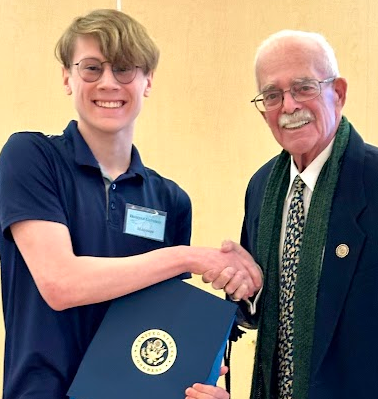Could Cohort be the new normal? Madison administration is exploring the option of expanding their interdisciplinary Cohort program for the entire freshman class curriculum. While the proposal and its implementation is hypothetical, it introduces the possibility of significant change to the freshman experience at Madison.
In 2019, administration introduced the Cohort program, a cross-curricular learning model that combines English, history and science curriculum for participating 9th and 10th grade students. The program takes a project-based approach to learning and mastery—instead of common multiple choice assessments, students participate in a variety of simulations, projects and presentations to assess their skills.
“The idea was to integrate history content, English content and science content, depending on what level they were in, all together and find common themes where the students could make connections for all the classes,” Cohort English teacher Virginia Keel said.
While this school year Madison administration cut science out of the Cohort model, the program still retains its cross-curricular characteristics with English and history. Typically, rising 9th and 10th grade students are given the choice to participate in this program, however the proposed change would make the model required, meaning the entire freshman class would be learning with an interdisciplinary curriculum when entering high school.
Concrete information on this proposal is scarce, highly theoretical and, at least at this point, no one is entirely sure what this change could look like or if it will be established at all. However, implementing the Cohort model for all freshmen could benefit students’ learning and help ease their transition into high school. For instance, the interdisciplinary style of the Cohort program is often more helpful for real world application than traditional methods of learning.
“You’re supposed to learn better in this way,” Miguel Fernandez, world history Cohort teacher, said. “Everything in the world is not segmented up into these nice little discrete ways. In the real world, you’re pulling from all your knowledge base to make things happen, and that’s sort of the idea; to make kids do that now.”
Additionally, the project-based style of Cohort also helps students through increased communication and collaboration skills.
“Hearing from current and former students as well, they tend to be able to function in group projects better because they are forced to do a lot with us,” Fernandez said. “They are not as anxious about things and generally know how to put presentations together a little better than their non-Cohort counterparts.”
Fernandez and Keel also note that because every project they assign in the Cohort curriculum tends to include research, analysis, and communication skills, Cohort students display huge growth in these areas over the course of the school year.
Along with the benefits to learning, the Cohort program also involves more teacher collaboration which could minimize students’ stress through better scheduling of serious assessments.
“If they have to do something like a more serious assessment in history, then in English, I might schedule mine separately or at a different time,” Keel said.
Additionally, Keel and Fernandez also explain that sharing the same group of students can help them better recognize when students need extra support.
“Another benefit for our students besides just the learning would be that the whole student gets supported in the sense that we share the same students and we talk every day, so if I notice something with a student in my class, I might bring it up with Mr. Fernandez and say ‘hey, did you notice this with them?’” Keel said. “So I feel we are able to really be there and support students and notice quicker when they are having issues.”
While there are clearly benefits to expanding Cohort, should the administration take away this choice from the students? Many students at Madison decide not to take the program and it is not without reason. While the project-based learning style may work for some students, it isn’t how every student wants to learn, and forcing students to learn in a way that doesn’t work for them could reflect poorly on their grades and hinder their learning. Additionally, the program’s focus on projects instead of traditional assessments could potentially also take a toll on students’ test taking abilities, making the transition from 9th to 10th grade more difficult.
“In the future, students will have to continue taking tests and having a year of not having to take any tests can diminish people’s test taking skills and abilities.” Delany Pfleghardt (’26) said.
There is no perfect learning model, and Cohort is no exception. As of right now, there are no concrete plans to implement this program, but there is no denying this proposal could transform the freshman experience in Madison.



